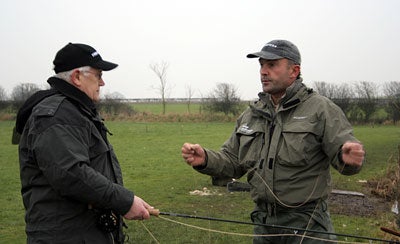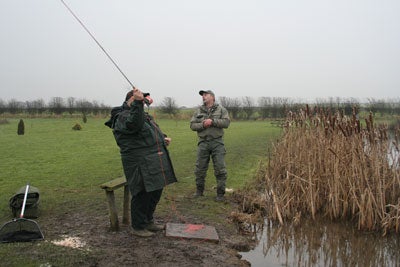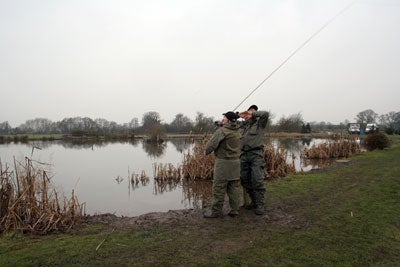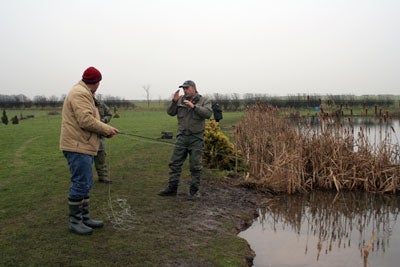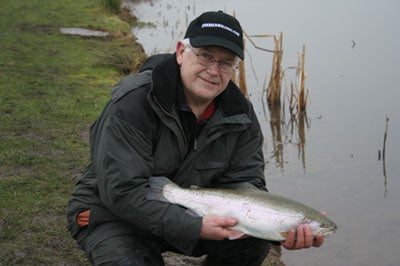| The four of us; me, Dave Colclough, Dave Chilton and Eddie Bibby, met Hywel Morgan at the British Fly Fair at Trentham in Staffordshire a few weeks ago. Hywel was giving fly casting demonstrations and to say we were impressed would be a gross understatement. Of course we didn’t know who he was then, but within a few minutes of watching him we knew he was special. The only other man we had seen casting anything like him before was Lefty Kreh, an American fly casting wizard who we had seen on DVD. We thought Lefty was the best in the world. Until that day at the British Fly Fair that is. Hywel was casting like Lefty with every different rod he picked up, and doing so while he looked around and chatted with the people around him.
The most noticeable thing was that he cast such phenomenal distances of 35 yards and more with such apparent ease. There was none of the strain you see with some anglers, no demented double hauling like somebody starting an old outboard motor, but just an easy motion with the rod that belied the distance he was achieving. Not just distance but pinpoint accuracy too, for he would tell you which leaf he was aiming for and then place the fly either on or within inches of it. It made you sick. How could a man cast so far and so accurately with so little effort? While we could cast half the distance with half the accuracy, it took a supreme effort. But effort was the key, we were to learn, or lack of it to be more precise. Fly casting is all about timing; get that right and you don’t need the effort. Back at home I searched for Hywel Morgan on the internet and found his website. No wonder he appeared to be the best fly caster in the world – he probably is! How’s this for a list of qualifications: He is the son of Welsh fishing guru Moc Morgan and first wet a line at just two and a half years of age and spent his early years fishing the Rivers Teifi and Ystwyth for wild brown trout and sea trout. Since then he has fished extensively throughout the UK, Europe, Australia and in the USA. Having grown up in his father’s shadow, Hywel decided to make a name for himself and started competing in casting competitions. He started at local country fairs, then progressed to the CLA Game Fair where for three successive years he won every event. As a result he was asked not to compete any more so that others could have a chance of winning… and all this before he was sixteen years old. He then turned to the British Casting Association and started to compete at British, European and World casting championships. During this time he amassed the following titles: World Games Accuracy Casting Champion He has represented Wales on twelve occasions (and has been captain for his country three times). Six times were at home internationals, where he was Top Rod on three occasions. The other six were at World Championships, where he captained the Welsh team to a silver medal in Ireland in 1995 and was a member of the silver medal winning team at England 2000. Impressed? You bet! I then spoke to both Dave’s and Eddie and we decided that the best thing we could do was get some lessons from Hywel. The cost would be £ 25.00 per hour plus expenses to get him to our choice of fly fishery. I emailed and then spoke to Hywel and the date was set, the lessons to be given at Ellerdine Trout Fishery in Shropshire. There would be no charge for expenses as he would call at the fishery on his way home from a business appointment, Ellerdine not being too far off his route back to his home in Wales. Just before we met Hywel we had a discussion about how to pronounce his name, not wishing to make t*ts of ourselves. Suggestions ranged from Highwell, Hoowell to Mr Morgan. In the end I said, sod it, I’ll ask him. We’d all got it wrong, Hywel is pronounced Howell. But as Hywel said when I told him the full range of suggestions, “I’ve been called all those at some time or other, take your pick, I don’t mind.” So we called him Taffy.
The lessons began. We each took a swim in a row of four along the bank where we would cause no interference to the other anglers on the water. Hywel spent some time with each of us, watching us cast with our own tackle and soon spotting each individual’s main faults. With each of us he demonstrated what we should do to rid ourselves of the faults and then left us to it for a few minutes while he moved onto the next man. We all had a few different faults, but we all shared one major fault. No matter which one he was with you could hear the same thing over and over again, “Wait… wait… wait…….” It was the back-cast. None of us were waiting long enough for the back-cast to straighten out. Of course, if you don’t allow the back-cast to straighten there isn’t enough weight to flex the rod and therefore you lose power on the forward cast.
The strange thing was, we could all get the first false cast right, and the second and even the third, but then we would lose it on the final, real cast that puts the fly on the water. I think it’s some kind of anxiety that sets in, where you make that extra effort because you know the real cast is the one that counts, so you try harder, put more into it – and that’s when it all goes wrong. For the one thing you shouldn’t do is put more effort into it. “Two false casts is usually enough,” Hywel said, “get those right and you don’t need any more than that.” “Try this,” he said, “think that you’re going to do three false casts and let go on the fourth, but instead, on the third false cast let go then instead. Try to get it into your heads that the last cast should be just another false cast with no extra effort.” Of course it was easier said than done, the main problem for all of us was remembering everything he’d told us, all at the same time. We could concentrate on one particular aspect of the cast but concentrating on more than one was extremely difficult.
As Hywel said, it’s all about practising now, and eventually all the different aspects of casting a fly line will come together. It’s like driving a car, you don’t have to actually think about depressing the clutch as you change gear. Getting the timing of those two movements spot on is something drivers do instinctively; it’s built in after so much driving experience.
Looking around the lake that day you could see that there were few anglers on the water who were casting classically, in the best possible style to propel a fly line, but most of them were getting a fly on the water near enough to where they wanted it. Like the four of us they had fallen into bad casting habits and compensated for it with extra effort. The major difference with fly casters like Hywel Morgan and Lefty Kreh and you and I is that they put their flies exactly where they want them with no apparent effort. They make it look so easy, and it is, if you have that skill built into your arm and your head to the point where you don’t have to think about what you’re doing; you just do it. Using the car driving analogy again, you have to have lessons in the first place, and then you need experience. Some drivers, no matter how long they drive, will never be good drivers, but they’ll be good enough to get from A to B without incident. It must be the same with fly casting, with lessons from a good caster to start you off in the right way, and then experience to get you to a decent standard.
Most of us will never reach Hywel Morgan’s standard, or come even close to it, but by taking a lesson or two from such a skilful and experienced caster so that we know what faults we need to iron out, we’re giving ourselves the best possible chance. I’m convinced that it isn’t just knowledge and experience that makes an extremely good fly caster, it’s something on a higher plane than that. A feel in the arm, allied to technical knowledge, a combination of the two that simply clicks into place and becomes as natural as breathing. But who knows, just maybe that clicking into place will come to us one day as we continue casting and fishing and learning. We can hope so, and as long as we enjoy the experience of trying to improve and catch a fish or two along the way, what does it really matter? |
Welcome!Log into your account











